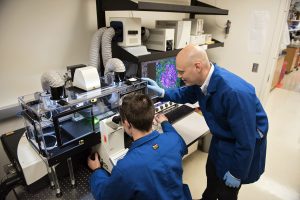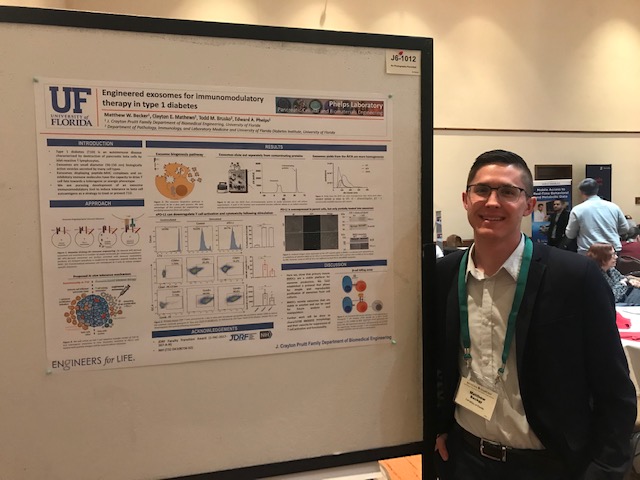Congratulations to Matthew Becker, Ph.D., on his first author paper titled, Immune Engineered Extracellular Vesicles to Modulate T Cell Activation in the Context of Type 1 Diabetes, being published in Science Advances.

Dr. Matthew Becker, postdoctoral fellow, and Dr. Edward Phelps, assistant professor in the J. Crayton Pruitt Family Department of Biomedical Engineering, along with collaborators in the lab of Dr. Todd Brusko in the UF Diabetes Institute, have conducted groundbreaking research that showcases the potential of extracellular vesicles (EVs) – small bubbles released by cells – in revolutionizing treatments for autoimmune diseases. As crucial messengers between cells, EVs contain proteins, DNA, and other molecules capable of influencing cell behavior. Their stable outer layer in body fluids and precise interaction with the immune system make EVs highly promising for significant advancements in medicine.
Extensive research has been dedicated to understanding EVs in cancer and autoimmune disorders. Certain EVs in cancer can hinder the immune system’s ability to combat tumors. However, scientists have discovered that modifying these EVs can activate the immune system, enhancing its effectiveness against cancer. In the case of autoimmune diseases like type 1 diabetes, EVs may contribute to the immune system attacking healthy cells. By unraveling the impact of EVs on our immune system, researchers aim to engineer these vesicles for groundbreaking therapies.
The team conducted laboratory experiments examining the effects of EVs on T cells. They found that specific molecules on EVs’ surface significantly influenced T cell behavior. Additionally, the presence or absence of a molecule called PD-L1 affected the immune response. The scientists successfully reduced T cells’ propensity to attack healthy cells through modifications to the EVs.
These findings provide valuable insights into the potential use of EVs for precise immune system modification. This advancement holds great promise for cutting-edge treatments targeting autoimmune diseases, particularly type 1 diabetes. By harnessing the capabilities of EVs and leveraging their impact on immune responses, scientists are gradually advancing toward effective management and potential cures for autoimmune diseases.
Team members:
- Matthew Becker, Ph.D., PhD student, Phelps Lab, University of Florida
- Leeana Peters, Ph.D., postdoctoral scientist, Brusko Lab, University of Florida
- Thinzar Myint, Brusko Lab manager, University of Florida
- Dylan Smurlick, UG student, Phelps Lab, University of Florida
- Andrece Powell, Phelps Lab manager, University of Florida
- Todd Brusko, Ph.D., Professor, Department of Pathology, Immunology and Laboratory Medicine, University of Florida
- Edward Phelps, Ph.D., Assistant Professor, J. Crayton Pruitt Family Department of Biomedical Engineering, University of Florida
